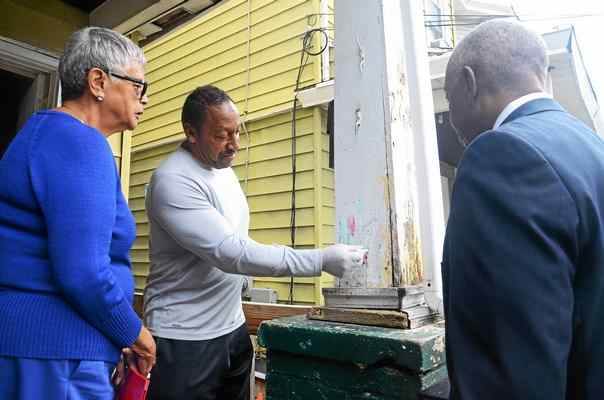These are crazy times. I could start by detailing the threats to our communities and the impact of proposed federal funding cuts on our work, but that’s not my message today. Isles’ mission of fostering self-reliant families and healthy communities matters deeply, in good and challenging times. The way we achieve that mission – by working with thoughtful, courageous people, across boundaries of party, ethnicity, religion, or zip code – matters now more than ever. You make our work and our approach possible.
Take, for example, the evolution of the new Social Profit Center at Mill One. Some years ago, Isles started to run out of office and training space. Instead of simply looking for a bigger place, we asked deeper questions about our next move – the type of “what if” questions that define Isles’ efforts.
What if we could save an old historic building in danger of being demolished and land-filled? What if we could design the project with leading energy and environmental technology and revitalize a community in need of reinvestment? What if Isles and other social profit, environmental and arts organizations could co-locate, share affordable spaces, services and resources and find new ways to collaborate – far into the future?
Could we bring all those benefits to one move? The answer was yes.
Through a low-cost sale, we acquired the mostly empty, massive old Atlantic Products Mill. It was audacious, risky and Isles’ largest project to date, requiring a multi-year capital campaign. And that was just before the Recession of 2008.
Our years of ambition and perseverance are paying off, as Isles prepares to move into the Center in early 2018, and we welcome organizations and artists to the new state-of-the-art historic mill. It will support Isles and 25+ other groups and help connect Trenton to the region for decades to come.
What’s most important is this: Isles applies the same kind of holistic thinking that conceived of the Social Profit Center to all our work. Urban agriculture combines the benefits of fresh food, health, civic connections, beautification. Healthy housing makes homes energy efficient and less expensive, and improves the health, intelligence and behavior of children. Community planning and development strengthens social and physical assets in neighborhoods. Isles Youth Institute provides education, job training, life skills and local service projects. Isles Financial Solutions helps where employees take control over their financial lives, benefitting employers as well. These are all core ways that we meet our mission – to foster self-reliant families and healthy, sustainable communities.
As we learn, we increasingly help others – community leaders, policymakers, and educators – invest in communities. We teach, broaden our impact, and maximize your investment in Isles.
You make it possible for us to stay hopeful and plan for a healthier future. Your unrestricted donation makes the biggest difference. It is our life-blood – by far our most valuable funding.
This holiday season, give a gift that will keep on giving. From our new Social Profit Center to so much more, we are not a typical organization, and we are only here because of like-minded people like you.
We need you more than ever.
In community,
Marty


 Christopher Cramer is the Vice President of Business Development at CytoSorbents, a critical care company specializing in blood purification to control deadly inflammation in critically-ill and cardiac surgery patients. Previously, he was Senior Director of New Venture Development at Johnson & Johnson (J&J). Prior to that, he was the Worldwide Strategic Marketing leader responsible for developing and executing branding and business development strategies for J&J’s minimally invasive weight-loss surgery division. Prior to J&J, he held multiple leadership positions at PwC Consulting and Parametric Technology Corporation. Chris earned his BS degree from Miami University and MBA and MS degrees from Carnegie Mellon University. He joined Isles’ Board of Trustees in 2017.
Christopher Cramer is the Vice President of Business Development at CytoSorbents, a critical care company specializing in blood purification to control deadly inflammation in critically-ill and cardiac surgery patients. Previously, he was Senior Director of New Venture Development at Johnson & Johnson (J&J). Prior to that, he was the Worldwide Strategic Marketing leader responsible for developing and executing branding and business development strategies for J&J’s minimally invasive weight-loss surgery division. Prior to J&J, he held multiple leadership positions at PwC Consulting and Parametric Technology Corporation. Chris earned his BS degree from Miami University and MBA and MS degrees from Carnegie Mellon University. He joined Isles’ Board of Trustees in 2017. Gary A. Gray is a Director of Finance in the Global Wealth and Investment Management division of Bank of America Merrill Lynch. His responsibilities have included the accounting functions of financial statement preparation, foot note disclosure, and general ledger installation. Business management functions over his career have encompassed budgeting, project management, regulatory reporting, financial projection preparation as well as new product reviews. Mr. Gray received a B.S. degree in Accounting from Hampton University and is currently pursuing a MBA from Rider University. Additionally, Mr. Gray is a proud member of Kappa Alpha Psi Fraternity, Inc. He joined Isles’ Board of Trustees in 2017.
Gary A. Gray is a Director of Finance in the Global Wealth and Investment Management division of Bank of America Merrill Lynch. His responsibilities have included the accounting functions of financial statement preparation, foot note disclosure, and general ledger installation. Business management functions over his career have encompassed budgeting, project management, regulatory reporting, financial projection preparation as well as new product reviews. Mr. Gray received a B.S. degree in Accounting from Hampton University and is currently pursuing a MBA from Rider University. Additionally, Mr. Gray is a proud member of Kappa Alpha Psi Fraternity, Inc. He joined Isles’ Board of Trustees in 2017.


